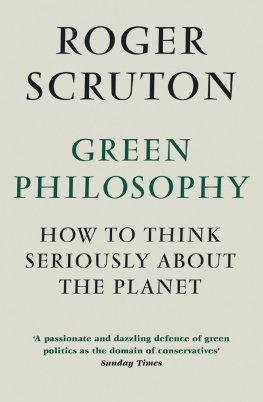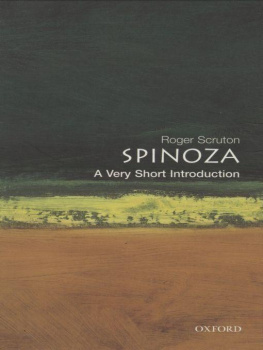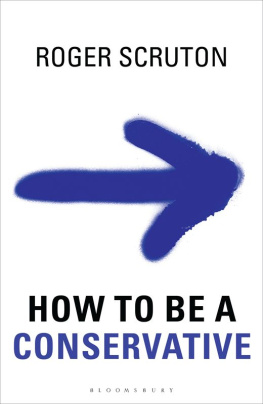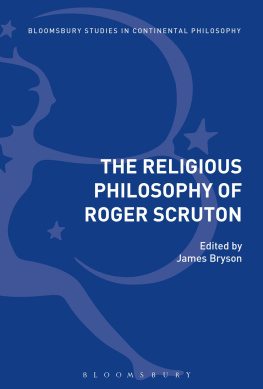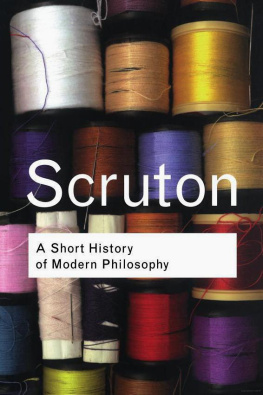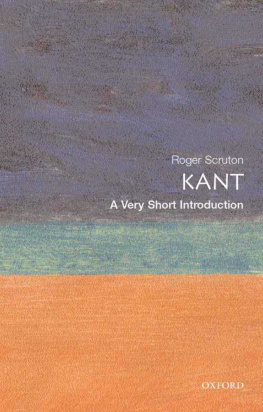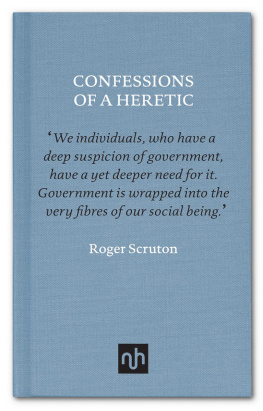GREEN PHILOSOPHY


First published in hardback in Great Britain in 2012 by
Atlantic Books, an imprint of Atlantic Books Ltd.
This paperback edition published in Great Britain
in 2013 by Atlantic Books.
Copyright Roger Scruton, 2012
The moral right of Roger Scruton to be identified as the author of this work has been asserted by him in accordance with the Copyright, Designs and Patents Act of 1988.
All rights reserved. No part of this publication may be reproduced, stored in a retrieval system, or transmitted in any form or by any means, electronic, mechanical, photocopying, recording, or otherwise, without the prior permission of both
the copyright owner and the above publisher of this book.
The extract taken from Burnt Norton, Collected Poems
The Estate of T. S. Eliot and reprinted by permission of Faber and Faber Ltd.
Every effort has been made to trace or contact all copyright-holders. The publishers will be pleased to make good any omissions or rectify any mistakes brought to their attention at the earliest opportunity.
1 3 5 7 9 10 8 6 4 2
A CIP catalogue record for this book is available
from the British Library.
978 1 84887 202 8
ePub ISBN: 978 1 78239 503 4
Printed in Great Britain
Atlantic Books
An imprint of Atlantic Books Ltd
Ormond House
2627 Boswell Street
London WC N JZ
Contents
Preface
The problems of the environment seem so far beyond our reach that we lurch from opinion to opinion and policy to policy with nothing to cling to, save the thread of our shared concern. We believe the scaremongers, since no one can be as gloomy as that without a reason. We believe the sceptics, since they offer hope, and remind us that the scaremongers have made an emotional investment in their gloom. And we watch as governments, NGOs and pressure groups both augment our anxieties and offer to assuage them.
Without the resources of government it is hard to address such problems as climate change, oil spills, plastic pollution and the loss of biodiversity. But history tells us that large-scale projects in the hands of bureaucrats soon cease to be accountable, and that regulations imposed by the state have side effects that often worsen what they aim to cure. Moreover, the same people who promise vast schemes for clean energy and reduced pollution, also promise vast schemes to expand airports, build roads and subsidize the motor industry. The fact is that, when problems pass to governments, they pass out of our hands. Our own understanding was shaped by local needs, not global uncertainties: it is the product of day-to-day emergencies, and its wisdom is the wisdom of survival.
But there is a lesson in this for the environmentalists. No large-scale project will succeed if it is not rooted in our small-scale practical reasoning. For it is we in the end who have to act, who have to accept and co-operate with the decisions made in our name, and who have to make whatever sacrifices will be required for the sake of future generations. It seems to me that current environmental movements, many of which demand far-reaching and even unimaginable government projects, as well as fundamental changes in our way of life, have failed to learn this lesson. Their schemes, like their cries of alarm, frighten the ordinary citizen without recruiting him, and he stands in the midst of a thousand warnings hoping to get through to the end of his life without going insane from the noise.
In this book I develop another way of looking at environmental problems, one that is, I hope, in keeping with human nature and also with the conservative philosophy that springs from the routines of everyday life. I do not offer detailed solutions to particular problems. Instead I propose a perspective on those problems that will make them seem like our problems, which we can start to solve, using our given moral equipment. That, it seems to me, is the enduring message of conservatism. And if it is greeted with hostility by those who cannot encounter a problem without advocating radical solutions with themselves in charge, then that is only further proof of its validity.
My intention in this book is to present the environmental question as a whole and in all its ramifications. Hence I have drawn on philosophy, psychology and economics, as well as on the writings of ecologists and historians. I argue that environmental problems must be addressed by all of us in our everyday circumstances, and should not be confiscated by the state. Their solution is possible only if people are motivated to confront them, and the task of government is to create the conditions in which the right kind of motive can emerge and solidify. I describe this motive (or rather, family of motives) as oikophilia, the love and feeling for home, and I set out the conditions in which oikophilia arises and the task of the state in making room for it. I defend local initiatives against global schemes, civil association against political activism, and small-scale institutions of friendship against large-scale and purpose-driven campaigns. Hence my argument runs counter to much of the environmental literature today, and may be greeted with scepticism by readers who nevertheless share my central concerns. For this reason I have explored the first principles of practical reasoning, and the ways in which rational beings can reach co-operative solutions to problems that cannot be addressed either by the individual or by the centralized state. I am critical equally of top-down regulations and goal-directed movements, and see the environmental problem as arising from the loss of equilibrium that ensues when people cease to understand their surroundings as a home. This loss has many causes; but not the least among them is the wrong use of legislation, and the fragmentation of society that comes about when the bureaucrats take charge of it.
Work on this book has been made possible by my position as resident scholar at the American Enterprise Institute, where I have been fortunate to find the collegiate atmosphere and open-minded opposition of which I was in need. I have benefited from conversations with many colleagues there, and in particular from discussions with Kenneth P. Green, Lee Lane, Stephen Hayward and Christopher C. DeMuth. I also wish to thank Kimberly Hudson and Keriann Hopkins for invaluable editorial assistance, and Tony Curzon Price, Angelika Krebs, Ian Christie, Alicja Gciska, Mark Sagoff and David Wiggins, who patiently read through earlier drafts and rightly reproached me for my many errors, not all of which have been corrected.
Scrutopia, July 2010.
ONE
Local Warming
The environmental movement has recently been identified, both by its supporters and by many of its opponents, as in some way on the left: a protest on behalf of the poor and the powerless against big business, consumerism and the structures of social power. But that image is highly misleading. In Britain the environmental movement has its roots in the Enlightenment cult of natural beauty and in the nineteenth-century reaction to the Industrial Revolution, in which Tories and radicals played an equal part; and the early opposition to industrial farming joined guild socialists like H. J. Massingham, Tories like Lady Eve Balfour, secular gurus like Rudolf Steiner, and eccentric radicals like Rolf Gardiner, who borrowed ideas from left and right and who has even been identified (by Patrick Wright) as a kind of fascist.
Next page
